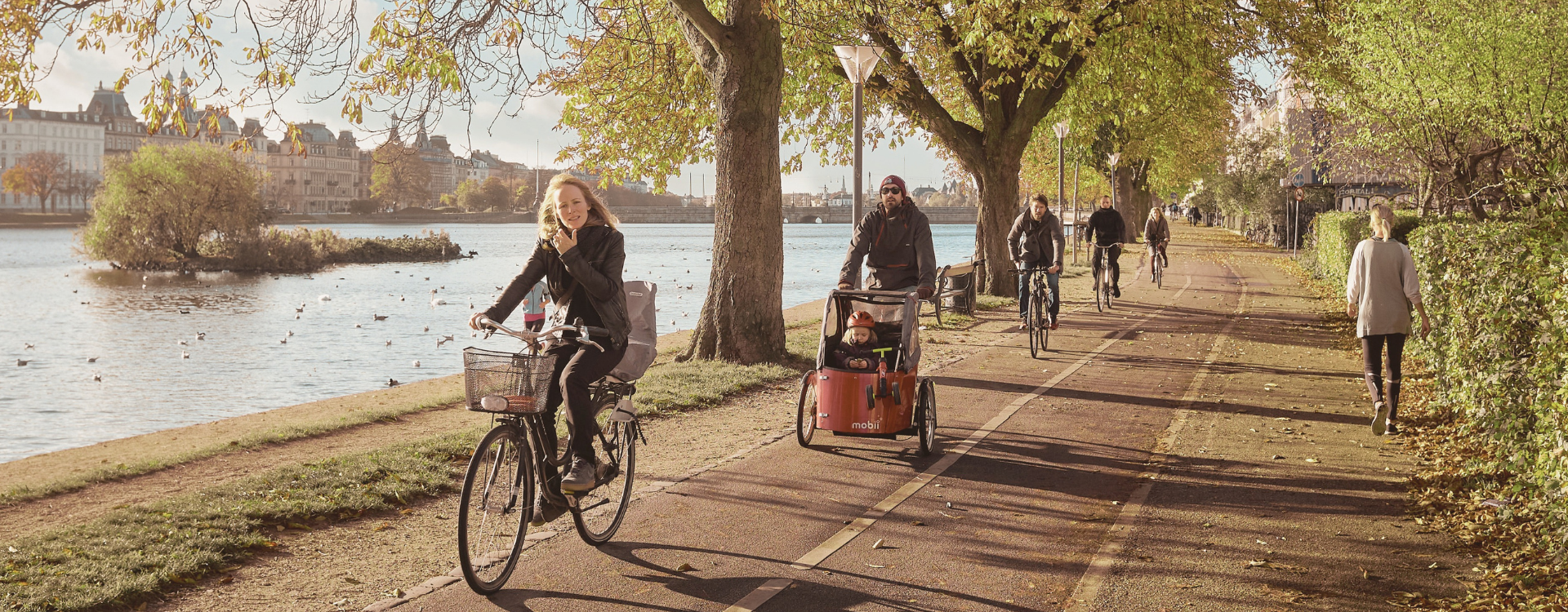
Ireland is overly reliant on private cars. This is manifest in the fact that 20.3% of our total greenhouse gas (GHG) emissions come from transport, the fact that in rural Ireland a driver’s licence is seen as a necessity, and the fact that moves towards more sustainable modes of transport meet fierce resistance, as we saw in Lucan village and in Sandymount Strand and Salthill, Galway recently.
But this resistance to change is just delaying the inevitable. The convenience of travelling by car is at the cost of the planet. Our government recognises this and has identified plans for expanded public transport in the Climate Action Plan (2021). The latest IPCC report published in April 2022, identifies Active Transport as a key systematic change which would not only reduce greenhouse gasses but also have multiple health benefits, reduce social inequities and lead to better urban planning.
Cycling is one of the most affordable methods of transport available. The pros are it’s free, healthy and fun. The cons that often prevent people from making the move to two wheels include the lack of safe, segregated cycling infrastructure, a shortage of secure space to store bicycles, (particularly in apartment blocks) and the prevalence of bike theft. For most of us, the cost of a bike is not a significant concern. But what about people who just can’t afford a bicycle?
Supporting people to buy bikes
The Bike-to-Work scheme, established in 2009, is a tax incentive aimed at encouraging employees to cycle to work by facilitating the purchase of a bike at a price discounted by the amount of income tax that would normally be paid.
A key limitation of this scheme is identified in its title: It targets only one type of journey, namely work commutes. Because of its design, it is limited in how useful it is in supporting a societal shift from car usage to bikes. It has helped many people to buy bicycles but key cohorts of society have been excluded from it including:
- Children;
- Students;
- Unemployed people;
- Self-employed people;
- Stay at home parents;
- Carers;
- People who cannot work due to disability;
- Those in the ‘Gig’ economy.
Among these groups are our most vulnerable citizens who can least afford to pay full price for a good quality bicycle, and who may be most in need of one. A Government of Ireland report ‘An Examination of the Cycle to Work Scheme’ (2021) identified similar issues with the exclusion of such a large number of groups.
In addition to limiting who is eligible, the Bike-to-Work scheme’s link to income tax rates means that the highest earners get the biggest discount. While being very effective on its own terms, it is a regressive policy. A person on minimum wage earning €21,294 gross in a year will receive a discount of €359.38 on their purchase if they spend the full €1,250 allowance. A person earning €49,000, the average full-time salary in the Republic, purchasing the same bike would however receive a discount of €609.38.
This disparity – almost 70% increase – in discounts received is not only unjust and unequal but arguably reduces the potential positive impact of the scheme.
Potential Solutions: Broadening the Scope
To reduce the inequality and exclusion inherent in the Bike-to-Work scheme, a complete redesign or the development of additional schemes should be introduced to ensure that the financial benefits are available to as many people as possible.
- 0% VAT
A standard VAT rate of 23% is applied to all bicycles. This includes bicycles that are sold second-hand in retail stores. VAT should be abolished for all bicycles, including folding bikes, e-bikes and cargo-bikes, up to a value of €1000 for push-pedal bikes and up to €1500 and €2000 (Ex VAT) for e-bikes and cargo-bikes respectively.
A reduction in VAT on cycling gear, including locks, lights, helmets, and attachments should also be considered. This option would have reduced administrative burdens on both employees and employers and would be accessible to everyone regardless of employment status.
An EU agreement in December 2021 means that EU countries will be able to charge 0% VAT on bikes and e-bikes, including supply, rental, and repair from mid-2022.
Ireland reviews its tax rates in its budgetary preparations. Consequently, it would be possible for Ireland to implement this change by the end of 2022. Any loss in income could potentially be offset from increases in VAT on luxury personal vehicles such as SVUs.
- 0% interest loan
A major advantage of the Bike-to-Work scheme is the ability to pay for the bike over a longer timescale, reducing the upfront cost burden. This facilitates those who may not have the full price of a bike available to them at time of purchase. Since 2018, Scotland has offered interest free loans for the purchase of cargo and electric bicycles allowing individuals and families to invest in decarbonised modes of transport. A version of this scheme should be developed for Ireland.
- Scrappage Scheme
A scrappage scheme where families and individuals looking to trade in an old car for an e-bike or a cargo-bike should be established. Introduced already in France and Finland and trialled in Coventry, England, these schemes work to remove old polluting cars from the road while replacing them with more sustainable options. This swap encourages a switch in the mode of transport used, not just bike ownership.
Implementing any one, or a combination, of these schemes would greatly improve the equitable access to bicycles and active transport. Ensuring policies are socially just and equal is a hugely important consideration when designing policies for climate action. Cycling offers the most cost-effective mode of transport in the neighbourhoods where most people in Ireland live. It has associated benefits for local business, public health, and personal wellbeing.
To effectively achieve carbon neutrality, many difficult choices will need to be made in the coming years. Easy wins like this should be grasped with both hands.

